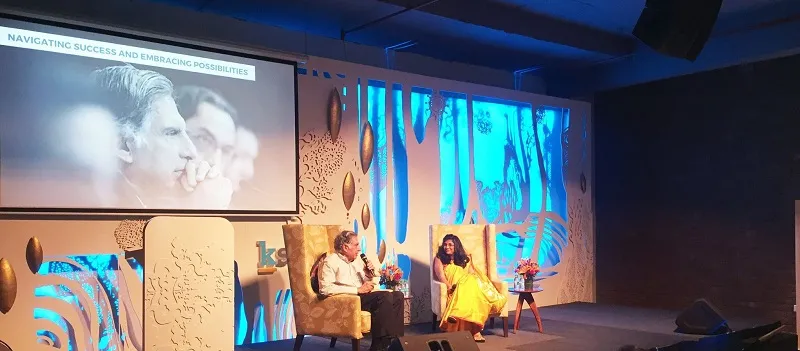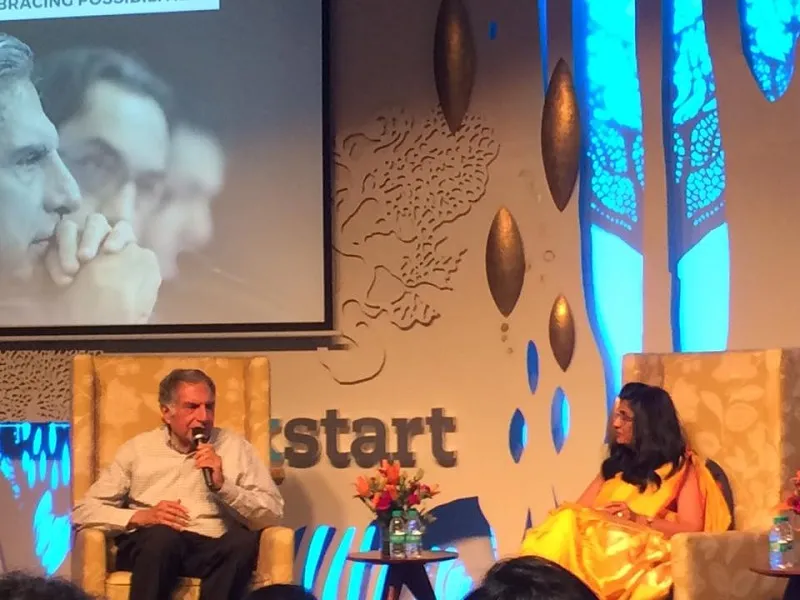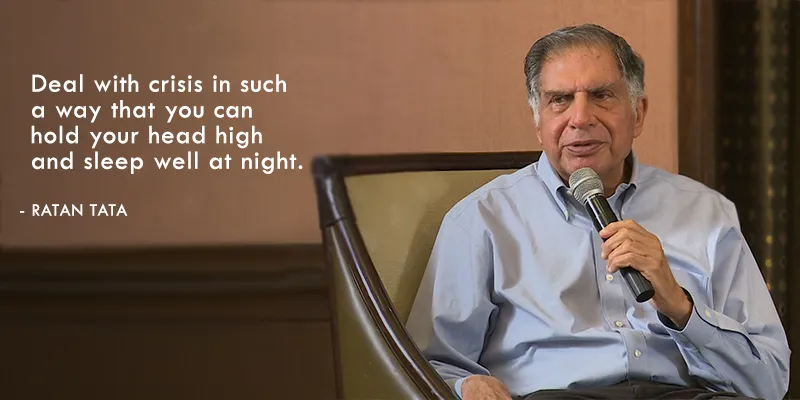Ratan Tata on intuition, facing crisis, and returning to startup land
Upon retiring from his position as Chairman of one of India’s oldest business houses, the Tata Group, Ratan Tata dedicated himself to nurturing India’s burgeoning startup ecosystem. Recent events at his old home, however, drew him back to the corporate world. Now, he’s set to come back!

Taking the stage with Mr. Tata, interim chairman of the Tata Group, at Kstart’s first anniversary, Vani Kola, MD of Kalaari Capital, noted that the Indian startup ecosystem had missed Mr. Tata’s presence, which it had taken for granted, over the past few months. She said,
We have been spoiled and expected that you would give time to this community continuously. We hope to see you back with the same vigour.
Addressing the gathering, Mr. Tata noted that when he retired as Chairman of the Tata Group in 2012 and was looking to do something new in life, he hit upon the idea of interacting with and investing in startups, which he now considers to be a new page in his life.
He noted that after running a big business, managing crores of rupees and facing large competitive challenges in his corporate career, he became excited by the passion and innovation he saw in the Indian startup community. Hence, he gave startups their due attention and time, investing in more than 25 startups.
But due to circumstances in the Tata Group, he was forced to come out of retirement and assume the position of interim Chairman of the Group, a post he has held for the last few months. He noted, though, that he is keen on returning to the startup world, and said,
As of 23rd Feb (2017), I am back, and I look forward to that day with greater vigour.
Mr. Tata noted that over the last few months, startups have faced challenging times with the changing landscape in India and also globally. He said that while Donald Trump has given rise to new challenges for the world, he is sure that Indian business can adapt and do well.
The changing Indian landscape

Mr. Tata noted that while India had historically been timid in terms of seizing and venturing into new opportunities, the younger generation is willing to take greater risks and start businesses. He noted that many startups are actually leading and not following. Startups are not afraid to venture into areas that were considered to be only for the ‘big boys’ not too long ago. The world has noticed this change too, and many foreign and local funds have been set up to invest in Indian companies.
Mr. Tata believes that if one is willing to think big and face the challenges, India provides a great opportunity for startups to do well. He said,
This is the new India of tomorrow- an India that stands on its own, willing to take risks and look beyond its shores for growth. I’m sitting here with the heartbeat of India. We shouldn’t let this moment pass.
How to give the right advice
On being asked by Vani Kola about how one should give the right advice to a person, Mr. Tata joked and said, “Not many people ask for my advice.”
Then he recalled a lesson that he learnt from one of his professors at Harvard Business School. He noted,
When giving advice, always try and put yourself in the shoes of the other person first. It gives you a different perspective. It is easy to give advice sitting in an armchair, but difficult to visualise what the person who is facing the challenge is going through and make a difference for them.
Having the humility to adapt yourself to that person’s point of view and then give advice from that perspective is what works.
‘Celebrity CEOs’ and giving back to the community

Vani Kola noted that Indian leaders are dynamic and also diverse - we have celebrity chefs, sportsmen, trainers and now even CEOs. She noted, “This is quite unique to India, and not necessarily in good way.”
She pointed out that the media tends to focus on founders and put them on a pedestal. For young CEOs, suddenly being in the limelight can be a pitfall. On being asked how he would counsel the new-age ‘celebrity CEOs’, Mr. Tata noted that young CEOs should not let success get to their head. He said,
Founders should be humble. Thinking they know everything could be the kiss of death. They should also not look down on someone who is trying to start a similar business.
Mr. Tata believes that founders should try to be co-operative, and that successful entrepreneurs should look to foster new ones and make a difference. He believes that while India has moved from a ‘country of shopkeepers’ to a flourishing business environment, there is still a long way to go, and that developing humility and being supportive of others is the right way forward. He said,
Let us not lose the momentum we have. We should build on what we have created for ourselves. 15 or 20 years ago, would we all be sitting in this room today as equals?
He noted that, in the past, people who saw success were mostly the ones who had already had great financial resources. But now, the playing field has been leveled. People have found ways to rise to the top through sheer hard work and determination, and this in turn inspires others to emulate them. He said, “Never let this idea die.”
Looking at the global scenario, Mr. Tata cited the example of the US, which has seen many successes because of the country’s ability to adapt and re-invent itself. He believes that people with ingenious ideas will be able to make a big difference in the India of tomorrow. So, he said, “We should move away from blocking success and should instead embrace competition.”
Protectionism
Bringing up the topic of protectionism, in the context of internet companies, which has been a raging debate on social media, Vani Kola asked Mr. Tata about his views on the topic and whether there should be a framework for protectionism in any way.
The respected businessman replied that one can’t generalise a complex topic like this. He felt that it is not fair for a company to say, ‘Protect me, but let there be a level field in every other way’. On the flip side, he also noted that unfair competitive practices by some corporations, if any, need to be controlled. He said,
The internet has opened a highway for commerce, which is today being used by new startups and will also be used by old business when it suits them. I think that the regulators need to focus on areas where there is unfair competition that can kill newer startups and ensure that there is enough latitude and enough of a playing field so that everyone has their chance.
In conclusion, Mr. Tata noted that while he would personally like an open environment that is not focused on blocking, which often stifles competition, there are occasions where blocking is worthwhile.
Listening to intuition vs data
Vani Kola noted that founders have to deal with liquidity and exits, balancing short term goals and long term vision and also finding a balance between growth and profitability. While dealing with all this, founders wonder how to come out successful. Should they listen to their intuition or base their decisions on facts and figures?
Weighing in on this, Mr. Tata noted that luck generally plays an important role in such decisions and that, sometimes, situations are also beyond one's control.
Listening to one’s gut feel and intuition is good, but sometimes, that passion can blind people too. Taking data-driven decisions is not always the best choice either. He said, “Sometimes, the right move is to let go, and at other times, intuition tells you to hang in there.”
In conclusion though, Mr. Tata noted that he favours intuition to an extent. He said,
There is an element of intuition in all of us, and you should let that play a role rather than just going with numbers. Most of the time, intuition shared with passion gives you the fuel to face the future.
How to face crises

Startup founders generally face a few crisis situations during the lifecycle of their venture. On being asked about the effective strategies to deal with crises and whether it is an acquired or latent skill, Mr. Tata noted,
Crisis is the greatest textbook of leadership
He noted that one often wonders where leadership skills come from, especially during times of crisis. Citing the example of the terror attack that hit Mumbai in 2008, he pointed to how people one generally considered to be mild and timid became leaders amidst the crisis and saved lives.
This happens in business too. He noted that there are leaders who deal with crisis head on, and others who look to cover it up. His advice is this:
Deal with crisis in such a way that you can hold your head high and sleep well at night, rather than sweeping it under the carpet and knowing it is decaying or dying.
(Disclaimer- Kalaari Capital and Ratan Tata are investors in YourStory)







